Ahmed Alofi, M.S., Jacob Kashiwagi, Ph.D., and Dean Kashiwagi, Ph.D., P.E.
Abstract
Saudi Arabia (SA) has the largest construction market in the Middle East. However, the use of the traditional procurement system in SA has been identified as one of the causes for poor performance in the delivery of construction. The system has been identified as a major risk to the SA government due to consistent increased costs and delays of up to 70% on projects. A survey was conducted with 1396 participants including engineers, buyers, contractors, consultants, academics, and architects. The purpose of the survey was to identify the validity of the recent claims that the procurement system in SA is broken. The participants work in both the private and government sectors. The survey results showed that the procurement system is a major risk to projects, affects construction projects negatively, and is in need of improvement.
Keywords: Saudi Arabia, Construction, Performance, Risk, Procurement.
Introduction
The largest market in the construction industry in the Middle East is Saudi Arabia. Also, it is expected that this growth will continue until 2015 (World Construction, 2012). Al Turkey (2011) conducted a survey through 300 project managers from several sectors about the important issues that face the construction industry in Saudi Arabia. This survey found 80% of projects suffer from increased costs, and 97% of projects exceeded the time limit of projects completion. Also, Al-Ghafly (1995) conducted a survey to determine the degree of delay in construction projects among owners, contractors and consultants. The consultants believe 84% of the projects suffer from delays, but contractors only believe that 37% of the projects have delays. Moreover, Zain Al- Abedien (1983) and Al-Sultan (1987) found that around 70% of projects suffered from delays in Saudi Arabia. The delays were inescapable because the contractors were selected on the basis of the lowest price (Assaf and Al-Hejji, 2006). Also, Assaf and Al-Hejji found the major cause of delay in construction projects is change orders (2006). Other reasons such as incorrect estimation, lack of experience, inadequate decisions in companies’ policy are strong causes of issues of construction projects in Saudi Arabia (Al-Barak ,1993). A. Alofi (2016) proposed a solution to develop Saudi Arabia’s procurement system by analyzing the current procurement system and conducting a survey. The survey was sent to professionals who work in the public sector and have an interest in procurement and contract system in Saudi Arabia. Depending on the survey, a new phase has been added called clarification into current procurement system in Saudi Arabia. By adding this new phase to the system, the outcomes of the system will be improved in the majority of projects in the Kingdom of Saudi Arabia (A. Alofi, 2016).
Problem
The Saudi Arabian procurement system is the major cause of the issues on construction projects in Saudi Arabia. Moreover, the system leads to many delays and negative impacts in projects. The negative outcome comes from the way of contractors’ selection who have been selected based on lowest price (Albogamy et al., 2012). In addition, the majority of contractors who have been selected are not qualified (Assaf and Al-Hejji, 2006). Alyaum newspaper (2013) interviewed Nasser Al-Hajri, who works in the eastern region at Chamber of Commerce and is interested with the procurement system in Saudi Arabia, says that the use of the Saudi Procurement System (SPS) causes problems and delays in construction projects. Also, the system has not been optimized in a long time.
Proposal
The research proposes that by conducting a survey upon 1396 participants about the major issues arising from the use of the traditional SPS, which selects contractors on the lowest price. The main objectives of the research are as follows:
- To identify the perceptions of a big number of interested professionals private and public sectors around the SPS.
- To prove that the system is the main reason for the delays in the most of construction projects in Saudi Arabia.
- To identify if the professionals agree with any future improvement on the system.
- To propose solutions for the future development of the SPS.
Methodology
In order to conduct the research, the authors did the following:
- Verify that the most important issue of the construction industry is the SPS through lecture reviews
- Propose hypothesis that the procurement system is broken and needs to be developed
- Conduct a survey about the perceptions of the SPS by using a sample of participants who work in the construction industry with an interest in the procurement system such as contractors, owners, consultants, engineers, architects, etc.
- Conduct and analyze the data and compare perceptions.
Survey Design
The survey was carefully designed in order to get the participant’s perceptions over the system of contractors’ selection, the impact of the procurement system on the projects, and the impact of contractors who have been selected by the SA procurement system on projects. Also, the survey has been collected in order to identify the perceptions and satisfaction of participants who work in the construction industry in both the private and governmental sectors with the current Saudi Arabian procurement system.
The questions that have been asked are as follows:
- Do you think that the traditional SPS chooses non-expert contractors?
- Do you think that the traditional SPS leads to project delays and increased costs?
- The huge Difference between market prices and the lowest proposal price leads to losses in time and money.
- Do you think that contractors who have very low and high prices affect the project negatively?
- Do you think contractor selection depending on how low-bid has a negative impact on construction projects?
- Do you feel there needs to be a change in the traditional SPS?
- What is your satisfaction with the traditional SPS? (1-10, 10 being the best).
The Professionals were able to answer the questions by using two different scales:
- Strongly Agree; Agree; Don’t know; Disagree; Strongly Disagree.
- Yes; No; I am not sure.
The survey has been sent to the participants who have been licensed by the government engineering professional group in SA through using the organization access. Moreover, the data was collected through 1396 participants out of 12683 participants who are interested with the procurement system and contracts in Saudi Arabia. The total number of participants who work in private sectors is 1151 participants, which included 710 engineers, 223 consultants, 88 contractors, 26 owners and 104 architects. In addition, the information collection in this paper considers 245 participants who work in governmental sectors including 157 engineers, 33 consultants, 9 owners, 5 vendors, 28 architects and 13 academics. All the participants of the private and government sectors have experience between a year and more than 25 years in different types of construction areas such as residential and commercial buildings, healthcare buildings, industrial building and heavy civil construction.
Results
The survey questions were designed carefully to identify the real perceptions of the participants regarding the Saudi Arabian procurement system. Some participants did not answer some survey questions, either for lack of their knowledge or for other specific reasons. Therefore, it has been considered only in those who have enough knowledge of the survey questions. Around fifty-four percent (53.51%) of the participants who work in private sectors think that the procurement system in Saudi Arabia chooses non expert contractors. Alofi (2015) identified that around eighty-one percent (80.61%) of them who work in government sectors think that the contractors who has been chosen in Saudi Arabia are not experts.
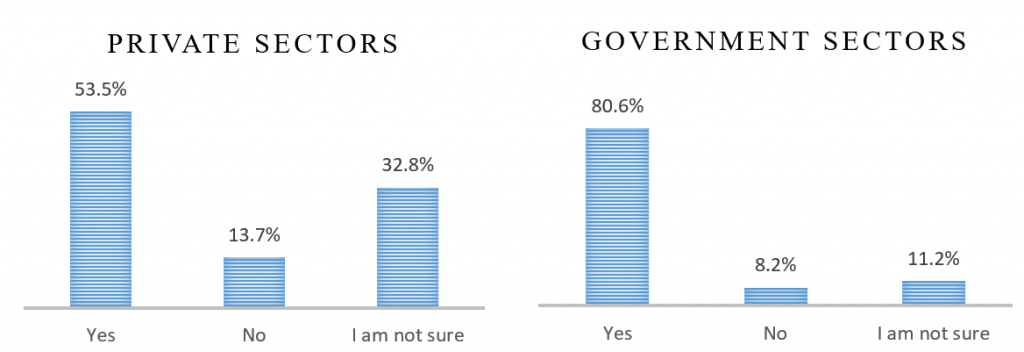
As seen in figure 2, approximately seventy-three percent (73.41%) of the private participants think that the traditional SPS leads to project delays and increased costs. Eighty-six percent (86.39%) of governmental participants agree with the question.
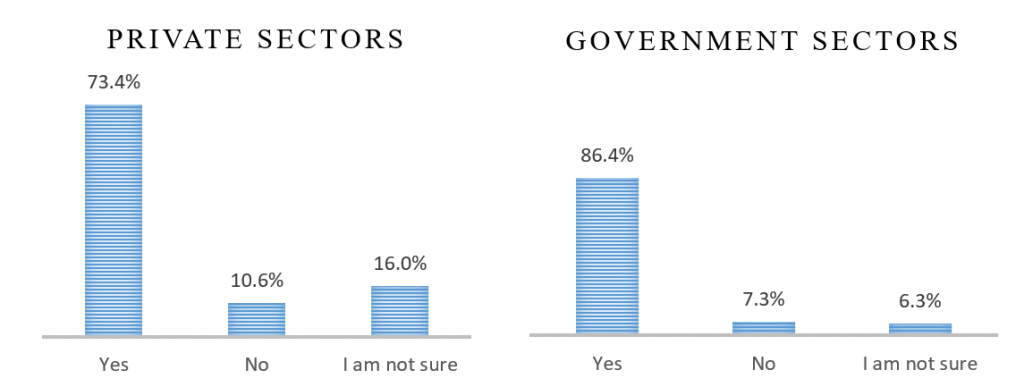
Around seventy-two percent of the participants who work in private and government sectors agree that there is a large difference between market prices and the lowest proposal price (35% less than market prices) thus maximizing losses in time and money, while only around eight percent (8%) of them disagree with it as is shown in figure 3. In addition, from the governmental participants, there are approximately ninety-four percent (94.1%), and eighty-eight (88.5%) from private sectors who think that the contractors who have very low and high prices affect the project negatively in Saudi Arabia as is seen in figure 4.
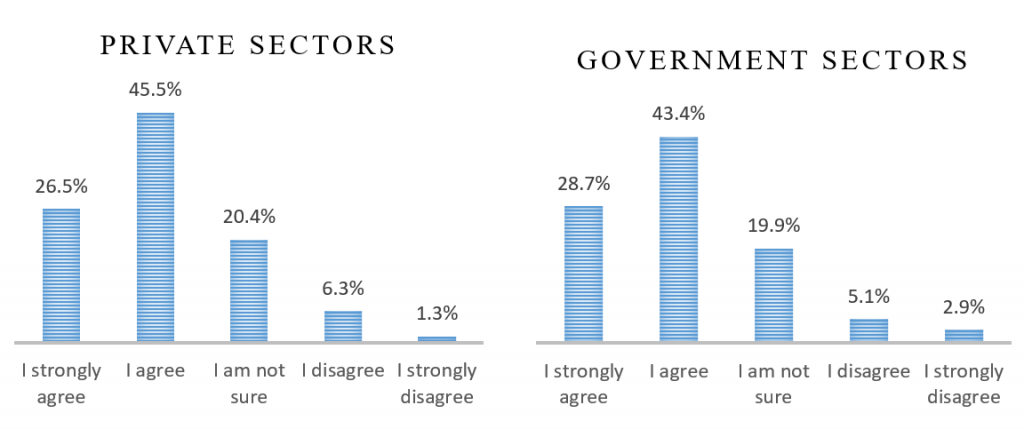

Figure 5 shows that around ninety-three percent (93.4%) of the participants who work in government sectors think that the contractors’ selection depending on low bid has a negative impact on construction projects (Alofi, 2015). Ninety-six percent (96%) of them who work in private sectors think that the Saudi Arabia projects has negative impacts due to the method of selection of contractors.
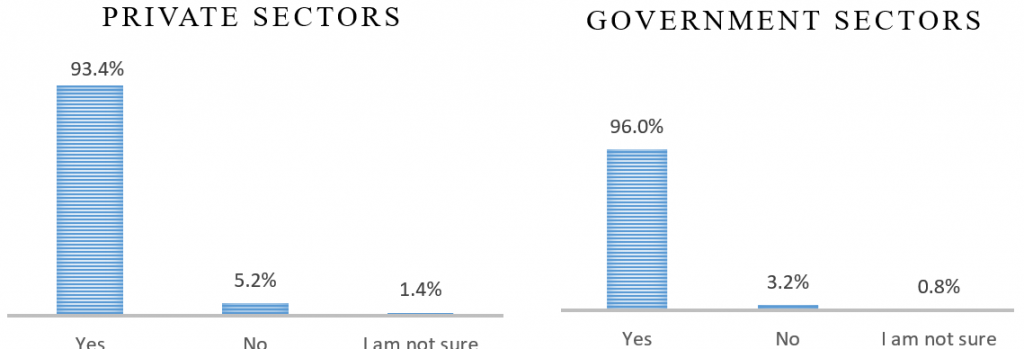
Moreover, about ninety-six percent (96.2%) of participants of government sectors, and around eighty-eight percent (87.8%) of participants of private sectors feel that there needs to be a change in the traditional SPS as is seen in figure 6. The participants’ satisfaction from private sectors with the traditional SPS is 5.03 out of 10, while the satisfaction of governmental participants is 4.21 out of 10.
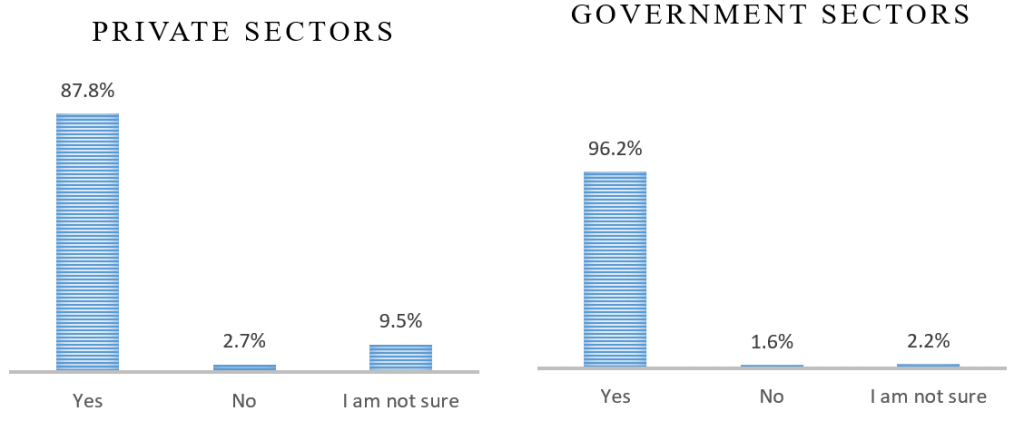

Table 1 shows the percentage of agreement of the participants who work in the private sector about the following statements: the system chooses non-expert contractors and leads to delays, low-bid method negatively affects projects, very expensive and cheap proposal negatively affect projects, the participants feeling and satisfaction with current SA procurement system. The table shows the data depending on 25 years of experience or more with different types of projects such as residential buildings, commercial buildings, healthcare construction, industrial construction and heavy civil construction. Moreover, as shown, the ratios that have been obtained are convergent between the different types of projects. More than 80% of respondents agreed with the statements and about 60% of them agreed that the system selects unqualified contractors. A slight difference in the results of the participants who work in heavy civil construction, about 78% of them believe that the SA procurement system leads to delays at projects and around 76% of the them believe that the low-bid influences negatively on the projects. In addition, 56% of the participants in heavy civil construction believe that the system selects unqualified contractors.
| Table 1: Perceptions of the participants from the private sector about the SPS, depending on the type of project. | |||||||
| Type of project | The system chooses non expert contractors | The system leads to project delays | lowest proposal definition has a negative impact | Low and high proposals has a negative effect | Low bid has a negative impact | System changing | Satisfaction |
| Residential buildings | 60.5 % | 83% | 88.7% | 94.3% | 100% | 96% | 4.64 out of 10 |
| Commercial buildings | 61% | 84.6% | 83.7% | 93% | 100% | 100% | 4.74 out of 10 |
| Healthcare construction | 56% | 82.9% | 84.6% | 92.3% | 100% | 100% | 4.33 out of 10 |
| Industrial construction | 68% | 87.2% | 86.2% | 93% | 100% | 95.5% | 4.84 out of 10 |
| Heavy civil construction | 63% | 78.8% | 76% | 100% | 95% | 94% | 4.79 out of 10 |
In addition, as seen in table 2, the perceptions of the participants who work with government sectors are shown and have 25 years or more of experience. Almost all the participants agreed with all statements. 71.4% of participants who work at residential buildings and around 75% of them who work at commercial buildings agreed that lowest proposal definition has a negative impact on projects. In addition, about 80% of them who work at commercial buildings and about 75% of the participants who work in healthcare construction agreed that the SA procurement system selects unqualified contractors.
| Table 2: The percentage of agreement of the participants from the governmental sectors about the SPS, depending on the type of project. | |||||||
| Type of project | The system chooses non expert contractors | The system leads to project delays | lowest proposal definition has a negative impact | Low and high proposals has a negative effect | Low bid has a negative impact | System changing | Satisfaction |
| Residential buildings | 100% | 100% | 71.4% | 100% | 100% | 100% | 3.88 out of 10 |
| Commercial buildings | 80% | 100% | 75% | 100% | 100% | 100% | 4 out of 10 |
| Healthcare construction | 75% | 100% | 100% | 100% | 100% | 100% | 3.5 out of 10 |
| Industrial construction | 100% | 100% | 100% | 100% | 100% | 100% | 3 out of 10 |
| Heavy civil construction | 100% | 100% | 100% | 100% | 100% | 100% | 4.8 out of 10 |
Analysis
The survey results reflect the real problem emanating from the procurement system in Saudi Arabia, which was one of the main reasons for this paper. As is seen, the results are convergent between the perceptions of participants in the public and private sectors in Saudi Arabia. However, the results of the government sector reflected more positive and agree with the objectives of the research compared to those who are in the private sector. For instance, about 89.33% of participants who work in the public sector agree that the Saudi Arabian procurement system leads to projects delays, chooses non expert contractors, affects the projects negatively in very cheap and expensive proposals and feel that there must be a change in the SPS, compared with 75.8 % of participants in the private sectors, which is 13.53% less than public sectors.
On the other hand, only on one question (if contractor’s selection depending on low bid has a negative impact on construction projects) is the result larger in the private sector by about 96% compared with the government sector, which gave a result around 93.4 %, with 2.6% difference between the two sectors. Moreover, there is no difference in the results between the sectors concerning the difference between market prices and the lowest proposal price, which leads to losses in time and money. Also, there are about 4.8 % from the government sector and 12.6% from the private sector who are not sure about some questions, for either lack of their experience or for other specific reasons.
Conclusion & Recommendation
Saudi Arabia suffers from several challenges and issues resulting from delays in the majority of construction projects. Many studies have identified that the main reason for project delays is the selection of contractors who have been selected by using the Saudi Arabia’s procurement system. The contractors are selected only based on the lowest price, so the majority of the selected contractors are not eligible. A survey was conducted with 1396 participants from the private and public sectors on their perceptions and satisfactions about the procurement system in Saudi Arabia. The results showed that the procurement system is broken, has negative impacts on projects, and it is in need of development.
After obtaining the perceptions of the participants in the survey, the researchers recommend fast improvements and radical changes in the SPS to improve its outputs, all cheap and very expensive proposals should be excluded, add new phases to test contractors to make sure that contractors are qualified before signing contracts, contractors should be monitored during construction work in order to ensure delivery of the project on time on cost, and reduce the owners’ control on contractors. The researchers recommend more research to develop the procurement system, due to its high value in the development of the construction industry in Saudi Arabia.
The questionnaire was collected among 1396 professionals who are interested with the SPS, and found that 73.41% of the private participants and 86.39% of governmental participants think that the traditional SPS leads to project delays and increased costs. Around seventy-two percent from the participants who work in private and government sectors agree that there is a large difference between market prices and the lowest proposal price, thus maximizing losses in time and money, however only around eight percent from them disagree with it. From the governmental participants, there are approximately ninety-four percent (94.1%), and eighty-eight (88.5%) from private sectors think that the contractors who have very low and high prices affect the project negatively in Saudi Arabia. Around ninety-three percent (93.4%) of the participants who work in private sectors and ninety-six percent of them who work in government sectors think that the contractors’ selection depending on low bid has a negative impact on construction projects. About ninety-six percent (96.2%) of participants of government sectors, and around eighty-eight (87.8%) of participants of private sectors feel that there needs to be a change in the traditional SPS. The participants’ satisfaction from private sectors with the traditional SPS is 5.03 out of 10, while the satisfaction of governmental participants is 4.21 out of 10.
The researchers have found that one of the most successful procurement systems in the world is the performance information procurement system (PIPS) with 98% of customers’ satisfaction (PBSRG, 2014). It consists of four different phases to choose an expert contractor (Kashiwagi, 2014). The model has been tested about 1750 times during 20 years in around 31 states in the United States of America (PBSRG, 2016).
References
| [1] | Al Turkey. (2011). The reality of projects in terms of organization and structure, and the reasons for success and failure In Saudi Arabia. Alwatan Newspaper. [Online] accessed on 12 March 2015 available from http://www.alwatan.com.sa/Local/News_Detail.aspx?ArticleID=49126&CategoryID=5. |
| [2] | Al-Abidien, Z. HM (1983), About the effect of delay penalty on the construction of projects and modification proposal. Albogamy, A., Scott, D., & Dawood, N. (2012). Addressing Construction Delays in the Kingdom of Saudi Arabia. International Proceedings. |
| [3] | Al-Barak, A. A. (1993). Causes of contractors’ failures in Saudi Arabia. Master of Science thesis, KFUPM, Dhahran, Saudi Arabia. |
| [4] | Albogamy, A., Scott, D., & Dawood, N. (2012). Addressing Construction Delays in the Kingdom of Saudi Arabia. International Proceedings of Economics Development & Research, 45. |
| [5] | Al-Ghafly, M. A. “Delays in Construction of Public Utility Projects in Saudi Arabia, KFUPM, Dhahran, Saudi Arabia.” (1995). |
| [6] | Alofi, A. (2015). Upgrade the Saudi Arabian Procurement System Delivery Method (Doctoral dissertation, ARIZONA STATE UNIVERSITY). |
| [7] | Alofi, A. (2016). An Analysis of the Current Procurement System in Saudi Arabia. 52nd ASC Annual International Conference Proceedings, Copyright 2016 by the Associated Schools of Construction. |
| [8] | Alofi, A., Alhammadi, Y., Kashiwagi, D., Kashiwagi, J., & Sullivan, K. (2015). Upgrade the Saudi Arabian Procurement System Delivery Method. Journal for the Advancement of Performance Information & Value, 7(1). |
| [9] | Alofi, A., Kashiwagi, J., & Kashiwagi, D. (2016). The Perception of the Government and Private Sectors on the Procurement System Delivery Method in Saudi Arabia. Procedia Engineering, 145, 1394-1401. |
| [10] | Al-Sultan, A. S. (1987). Determination of construction contract duration for public projects in Saudi Arabia (Doctoral dissertation, Master thesis, KFUPM, Dhahran, Saudi Arabia). |
| [11] | Altolany, S. (2013, October 27). Contractors are demanding the development of government procurement and contracting systems. Retrieved December 31, 2015, from http://www.alyaum.com/article/3100418. |
| [12] | Assaf, S. A., & Al-Hejji, S. (2006). Causes of delay in large construction projects. International journal of project management, 24(4), 349-357. |
| [13] | Kashiwagi, D. (2014). 2014 best value stander Mesa, Arizona: Kashiwagi Solution Model (KSM). |
| [14] | Kashiwagi, D. (2014). 2014 information measurement theory with the “Kashiwagi Story” Mesa, Arizona: Kashiwagi Solution Model (KSM). |
| [15] | Langdon, D. (2012). World Construction 2012. An AECOM Company. Najdeno, 30. |
| [16] | Performance Based Studies Research Group. (2014). Retrieved June 11, 2015, from http://pbsrg.com/. |
| [17] | Performance Based Studies Research Group. (2016). Unpublished Raw Data. |